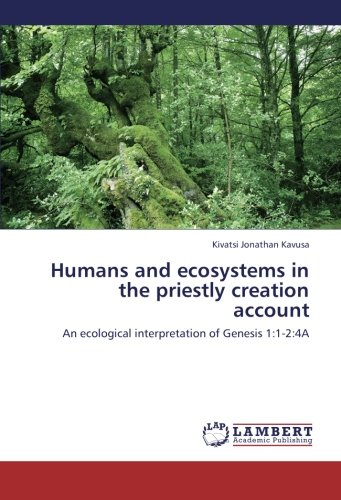Humans and Ecosystems in the Priestly Creation Account
A serious, professional and manageable contribution to Bible study on a highly relevant contemporary concern, as well as a gift to those looking for Bible Study relevant to today’s world
 Humans and Ecosystems in the Priestly Creation Account: An Ecological Interpretation of Genesis 1:1-2:4a
Humans and Ecosystems in the Priestly Creation Account: An Ecological Interpretation of Genesis 1:1-2:4a
Jonathan Kavusa Kivatsi
Lambert Academic Publishing
ISBN 978-3-659-42345-1
Reviewed by Alec Gilmore
Not many Baptists will be falling over themselves to get this, which is unfortunate because it has a double merit. One, a serious, professional and manageable contribution to Bible study on a highly relevant contemporary concern, not only to ‘the faithful’ but to the whole of God’s creation, ecology and climatology to boot.
Two, a gift to those looking for Bible Study relevant to today’s world and a bonus for preachers and teachers always on the lookout for common ground with the wider (non-churchgoing) public. Starting in a different place with a different approach could open new doors all round. True, many who start may never get beyond the first half, but for practical purposes at that point it will have done its job. The second half can be left to the specialists.
Kivatsi’s starting point is that much of the Bible, especially the Old Testament, is anthropocentric, as far back as this text in Genesis, not because the Bible (per se) is anthropocentric but because that is how we have chosen to read, interpret and teach it almost from the outset, and today especially this is not simply an academic issue. After reminding us that most interpretations of creation are human-centred, and driven by anxieties concerning ‘the further destruction of the ecosystems’, basic unanswered questions and questionable assumptions are put to the test. Does Genesis 1:26-28, for example, ‘give humans the mandate of domination over the earth and the animals’ or the ‘human despotic exploitation of the earth and its potential for (human) benefit’? What are we to understand by ‘made in the image of God’ or the Hebrew roots for the English ‘dominate’ or ‘subdue’?
Having cleared the ground Kivatsi then explores how much in the Old Testament, hitherto ignored or dismissed, brings ‘valuable ecological wisdom into view’ with different concepts (such as ‘interconnectedness’) running through the whole of the created order, providing fresh openings ‘to bring the reader into the text’. His object is not to unearth the original meaning, the historical sense, the intended sense or the literal sense, but ‘the plain sense' of the text. Other interpretations over the years are set out and evaluated, provide additional resources and and should not be overlooked, but Kivatsi’s main contribution is to open our eyes to territory where we may be suffering from biblical astigmatism.
The price is less than helpful but access to academia.edu may facilitate a download and a popular demand for a Kindle Version may not fall on deaf ears.
Alec Gilmore is a Baptist minister
Baptist Times, 14/01/2020